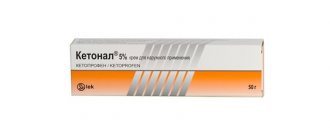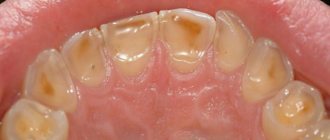Pain management is the most common process in all of medicine. There are many ways to relieve pain of all kinds (from using any cold object to surgical methods), but one of the simplest, most common and effective is medication, namely by taking pills.
Today, drugs such as Ketorol and Ketonal are extremely popular. These drugs can be used both in tablet form and in injection form, however, tablets, due to their ease of use, high availability and equally high effectiveness, are replacing the injection forms of these drugs in terms of prevalence.
Every person should clearly know that despite their names being very similar to each other and the general class of medications, Ketonal and Ketorol are different drugs. This difference needs to be understood in detail.
"Magic" pills
There is a group of drugs collectively called non-steroidal anti-inflammatory drugs (NSAIDs), which we all have taken at least once in our lives, and many regularly. These are drugs that have analgesic, anti-inflammatory and/or antipyretic effects. Examples include Aspirin, Nurofen, Nice, Ketanov, Ketoprofen and others. Considering the “magical effects” of their action - relieving inflammation, pain and fever - they are prescribed by almost everyone, everyone, always. Prescribed by traumatologists, rheumatologists, therapists, ENT specialists, dentists. Plus, they can be purchased completely freely at any pharmacy. But, along with the “magical properties”, these drugs have a number of side effects that can be divided into 2 groups: cardio risks and gastro risks. Actually, gastrorisks will be discussed in this article.
Comparison of Ketonal and Ketorol
To understand which product is more effective, you need to compare them.
Similarities
The similarities between the medications are as follows:
- are non-hormonal drugs with non-narcotic effects;
- have the same effect - relieve pain, eliminate inflammation and reduce body temperature;
- differ in the speed of onset of the effect;
- Available in tablets, gels and solution for injection;
- You can purchase them without a doctor's prescription.
Both drugs are taken only after consultation with a doctor who will examine the patient’s symptoms and complaints.
What is the difference?
Ketonal and Ketorol differ:
- by different manufacturers;
- different active ingredients;
- indications and contraindications.
Ketorol has several times more side effects, and they are much more dangerous. Also with contraindications.
Which is stronger and more effective?
A stronger remedy is Ketorol. It eliminates any pain well, and the effect after taking the drug comes much faster. Ketonal has a more pronounced anti-inflammatory and antipyretic effect.
Which is cheaper?
The prices for the drugs are as follows: Ketorol - 220 rubles, Ketonal - 410 rubles.
NSAID gastropathy
In the scientific literature, this problem is called “NSAID gastropathy.” The term was first proposed in 1986 to distinguish specific damage to the gastric mucosa that occurs with long-term use of NSAIDs from classic peptic ulcer disease.
The difference between NSAID gastropathy and peptic ulcer disease can also be traced by the affected area. Most often, ulcers can be seen in the stomach, and not in the duodenum. Plus, the changes are more common in older people than in younger people.
Some numbers
Some statistics. In the UK, approximately 24 million NSAIDs are prescribed per year. 70% of people over 70 years of age take NSAIDs once a week, and 34% daily. In the United States, up to 6 billion worth of NSAIDs are sold annually. As a result, the risk of developing gastrointestinal bleeding (GIB) increases 3–5 times, perforation by 6 times, and the risk of death from complications by up to 8 times. Up to 40–50% of all cases of acute gastrointestinal tract infections are associated with NSAIDs.
This problem is also relevant in our country, for example, according to the Scientific Center for Cardiovascular Surgery named after. A.N. Bakulev, out of 240 patients taking aspirin daily, even in small doses, gastroscopy revealed lesions of the stomach and 12 p.c. in 30% (of which ulcers - in 23.6%, erosions - in 76.4%). A similar picture was observed among colleagues from the All-Russian Research Institute of Rheumatology of the Russian Academy of Medical Sciences - in 2126 patients taking NSAIDs without “covering” (protection) of the stomach, erosions and ulcers of the gastroduodenal zone were found in 33.8% of cases. These are very impressive and dramatic numbers of complications from taking NSAIDs, considering the number of people using these drugs in developed countries.
Patient reviews
Elena, 33 years old, Moscow: “I recently injured my knee. I didn’t pay attention to it for several days until swelling appeared. It became difficult to walk, so I went to the doctor. The specialist prescribed Ketonal tablets. After 2-3 days the swelling subsided, the pain decreased, and after 10 days everything went away.”
Dmitry, 45 years old, Kaliningrad: “I have been suffering from chronic headaches for a long time. I am saving myself only with Ketorol, which the doctor prescribed. To achieve the desired result, I give 4 injections a day 3 times a year for a month. There have never been any side effects."
How it works?
How do these drugs work in our stomachs? Everything is very simple, the negative impact is realized due to the imbalance of defensive and aggressive forces. We have a number of defense mechanisms in our stomach that allow us to withstand the onslaught of aggressors. Among the latest:
- An acid whose pH balance is close to that of battery acid
- Bile and pancreatic juice, which can be thrown into the stomach.
- A number of medications.
- Alcohol and nicotine.
- Irritating food components (spices, spicy foods, etc.)
- Helicobacter pylori infection and so on.
The stomach is protected due to a thick layer of mucus and bicarbonates that neutralize acid, adequate blood supply, and the ability to regenerate very quickly. When we use NSAID drugs, the balance of forces changes towards aggressive mechanisms and damage occurs to the mucous and submucosal layer of the stomach and duodenum.
Use during pregnancy
According to studies, ketaprofen can have a negative effect on the general course of pregnancy and provoke spontaneous abortion. In addition, when taking the drug there is a risk of developing intrauterine pathologies of the fetus. At the same time, the likelihood of negative consequences for the mother and unborn child increases depending on the dose and duration of use of the drug.
Ketanol injections are prescribed in the first and second trimesters only in cases where the benefits to the woman outweigh the possible risks to the fetus. In this case, the minimum effective dose is indicated, which is taken in a short course.
Absolute contraindications to taking the drug in the third trimester are explained by the fact that ketanol injections can lead to the possible development of weakness of the uterus and other pathological conditions. In addition, even small doses of the drug during this period of pregnancy can increase the duration of bleeding and have a negative effect on the fetus. The use of ketanol injections during lactation is attributed to the fact that studies on whether ketaprofen gets into breast milk and its effect on the child have not been conducted.
Diagnostics
To diagnose such changes, gastroscopy is used, which is the “gold standard”. An interesting fact is that about 40% of patients with erosive-ulcerative changes who take these drugs for a long time (more than 6 weeks) do not feel any discomfort or unpleasant, painful sensations. Stomach problems are diagnosed only when visiting other doctors, and not a gastroenterologist. And, conversely, in 40% of patients, despite the complaints they make, nothing is found.
Composition and indications
The main active ingredient in the drug is ketoprofen. Ketonal ampoules contain 2 ml of solution with 100 mg of active substance. The injection liquid may be clear or have a slightly yellowish tint.
Ketoprofen has anti-inflammatory, analgesic and antipyretic properties. It is quickly absorbed from the gastrointestinal tract, which causes quick results.
Ketonal injections are indicated in the treatment of various diseases for the symptomatic treatment of disease processes. They are most effective for relieving pain that accompanies inflammatory and degenerative diseases of the musculoskeletal system.
Ketonal injections, the instructions for use confirm this, improve the condition of rheumatoid and seronegative arthritis during exacerbation of diseases when severe pain occurs.
For symptomatic treatment, the drug is also prescribed:
- For gout. With the development of this disease, uric acid salts are deposited in the joints, which causes their modification and severe pain. Ketonal injections are indicated to relieve an attack of gout, which is characterized by swelling in the area of one of the joints and pressing pain in it.
- For osteoarthritis. As a rule, the cause of the pathology is damage to the joint or an inflammatory process in it. Ketonal injections can relieve pain and maintain joint mobility.
Ketonal injections are prescribed to relieve post-traumatic and postoperative pain syndrome. Thanks to its pronounced analgesic properties, the drug improves the condition of cancer, algodisminorrhea, and inflammation of the pelvic organs. It can be used to relieve severe headaches caused by various reasons, as well as in other pathological conditions:
- Migraine.
- Myalgia.
- Bursitis.
- Radiculitis.
- Neuralgia.
What to do in this case?!
The algorithm of actions for patients who do not have stomach problems and those who have a history of peptic ulcers or erosive changes is different. For the first group, when prescribing non-steroidal anti-inflammatory drugs for more than 5 days, it is mandatory to prescribe drugs from the group of proton pump inhibitors (PPIs). Such as omeprazole, pantoprazole, rabeprazole, etc. (for the entire course of treatment). For the second group, any prescriptions from the NSAID group, regardless of the duration of use, require parallel prescription of proton pump inhibitors. It is also mandatory to take a PPI for patients taking aspirin for a long time.
Side effects and overdose
Ketonal injections, the instructions for use warn about this, can cause serious negative side reactions of the body from various systems of the human body. You should carefully read the manufacturer's warnings before using the product for symptomatic treatment.
The most common side effects are insomnia, depression, and asthenia. Nervous system disorders may be accompanied by headaches and increased weakness. Also, after taking the medicine, dyspeptic disorders often occur.
An overdose of ketoprofen poses a health risk. Higher doses may cause vomiting and abdominal pain. The drug, used once in large quantities, can lead to respiratory depression, convulsions, and loss of consciousness. There are risks of developing renal dysfunction. If an overdose is confirmed, you urgently need to rinse your stomach and take absorbents. Further symptomatic treatment is recommended.
Ketonal injections, which are affordable, interact with many other medications. Therefore, it is strictly forbidden to use them for self-medication. Dosages are prescribed by the doctor depending on the patient’s condition and in accordance with the recommendations of the instructions for use.
Myths that we encounter in daily practice
Myth 1. Using NSAID drugs in the form of suppositories is less aggressive for the stomach than taking pills
This is 100% a myth. The pathogenic, destructive effect of the drug is realized through the blood, delivering it through the vessels to the stomach.
Myth 2. Medicines from the group of antacids - Rennie, Maalox, Phosphalugel and H2-blockers (Ranitidine and Famotidine) can be used as “gastroprotectors”
In this case they are not effective.
Myth 3. You can't take proton pump inhibitors regularly
The fact is that if an elderly person has been prescribed an anti-inflammatory drug for life, it is absolutely pointless to prescribe gastroprotection for a month. In such cases, medications should be taken strictly in parallel.
Myth 4. Food products (jelly, etc.) can act as “gastroprotectors”
We will leave this myth as absolutely fantastic without comment.
Reviews from doctors about Ketonal and Ketorol
Sergey, 40 years old, therapist, St. Petersburg: “I often prescribe Ketonal to my patients. This drug has a good anti-inflammatory effect and is a good pain reliever. It has many adverse reactions, but patients rarely complain about their occurrence. The injectable form is considered especially effective.”
Marina, 50 years old, therapist, Murmansk: “Ketorol is a strong pain reliever. I often prescribe it to patients for pain relief. It has many contraindications and dangerous side reactions, but patients practically do not complain about the drug. I often recommend using the injectable form, but tablets also show good results.”
How to choose a medicine
In fact, the most important point is which medications we take. In the figure you can see the scale of aggressiveness of various drugs from the NSAID group in relation to the stomach.
The most aggressive drugs are Aspirin, Ketorolac, Piroxicam, Indomethacin. If possible, it is recommended to use selective drugs that have minimal gastrointestinal risks. Their use is always more desirable, these include Celecoxib and Rofecoxib. But despite their relative safety, they should be prescribed strictly according to indications by the attending doctor, do not forget about this.
What is better - Ketonal or Ketorol?
When choosing which drug to prescribe, the doctor studies its characteristics: indications, contraindications, development of adverse reactions. In some cases, Ketonal will cope well, in others - Ketorol.
For osteochondrosis
Only a doctor should determine which drug is best to use for osteochondrosis. It all depends on at what stage of the disease they are used. Ketonal is used for the inflammatory process that accompanies cervical chondrosis, and Ketorol effectively eliminates pain.
We recommend reading: Tablets and injections of the drug Trental for various diseases
For pain
When pain occurs, including headaches and dental pain, Ketorol, which is a powerful analgesic, provides better pain relief. Ketonal does not have such an effect.
For oncology
If a person experiences severe pain due to cancer, then only Ketorol can help.
For joints
Inflammatory processes occurring in the joints are well eliminated by Ketonal, and pain syndrome is eliminated by Ketorol.










